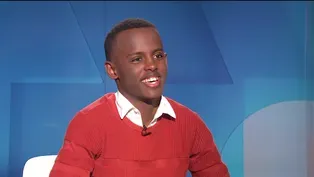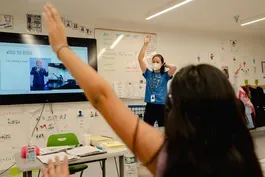
Why pro athletes are pushing for paid maternity leave
Clip: 1/27/2024 | 6m 7sVideo has Closed Captions
Why professional athletes are bolstering the push for paid maternity leave
The 2024 Australian Open was an example of a growing trend in women’s professional sports: eight players in the tournament had returned to tennis after pausing their careers to have children. USA outdoor track champion and Olympic medalist Alysia Montaño, who heads &Mother, a nonprofit focused on removing systemic barriers to allow mothers to succeed in sports, joins Ali Rogin to discuss.
Problems with Closed Captions? Closed Captioning Feedback
Problems with Closed Captions? Closed Captioning Feedback
Major corporate funding for the PBS News Hour is provided by BDO, BNSF, Consumer Cellular, American Cruise Lines, and Raymond James. Funding for the PBS NewsHour Weekend is provided by...

Why pro athletes are pushing for paid maternity leave
Clip: 1/27/2024 | 6m 7sVideo has Closed Captions
The 2024 Australian Open was an example of a growing trend in women’s professional sports: eight players in the tournament had returned to tennis after pausing their careers to have children. USA outdoor track champion and Olympic medalist Alysia Montaño, who heads &Mother, a nonprofit focused on removing systemic barriers to allow mothers to succeed in sports, joins Ali Rogin to discuss.
Problems with Closed Captions? Closed Captioning Feedback
How to Watch PBS News Hour
PBS News Hour is available to stream on pbs.org and the free PBS App, available on iPhone, Apple TV, Android TV, Android smartphones, Amazon Fire TV, Amazon Fire Tablet, Roku, Samsung Smart TV, and Vizio.
Providing Support for PBS.org
Learn Moreabout PBS online sponsorshipJOHN YANG: Irina Sabalenka of Belarus won her second straight women's singles championship today at the Australian Open tennis tournament.
This first Grand Slam event of the year is an example of a growing trend in women's professional sports.
Eight players in the tournament had returned to the sport after pausing their careers to have children.
As Ali Rogin tells us, it's a scenario that's playing out on the courts, fields and tracks around the world.
ALI ROGIN: New parent and tennis star Naomi Osaka threw a spotlight on the issue of paid family and medical leave.
She launched an ad campaign with Bobbie, an organic infant formula company that advocates for a national paid parental leave policy in the US.
NAOMI OSAKA, Professional Tennis Player: With shy, I had the choice and the financial support to return to work on my own terms.
Most parents in this country do not have that choice.
The initial fear in the very beginning of pregnancy, that's something I had to push past because I was very worried that a lot of people, like sponsors, would drop me.
ALI ROGIN: The U.S. is one of only a handful of countries in the world that doesn't offer paid parental leave for new mothers.
One in four women in the U.S. return to work two weeks after giving birth.
Alysia Montano heads up and mother, a nonprofit focused on removing systemic barriers to allowing mothers to succeed in sports.
Montano is also an Olympic medalist, six time USA outdoor track champion, and a mother of three.
Alysia, thank you so much for being with us.
Is it true in your experience and your observation that the perception that motherhood is a career killer is still true?
ALYSIA MONTANO, President, &Mother: I think from the work that we've done and mother, we've helped break down these barriers of that actually being a true statement.
What makes it true is the systemic barriers that exist and continue to exist that actually ultimately end up being the career killer, not the fact that we are not able to continue our careers.
ALI ROGIN: Yeah, absolutely.
And you've said that in your experience, the companies you were working with would treat pregnancy as an injury as opposed to a natural part of somebody's life.
That seems true not just in sports, but in many other industries, too.
And I'm wondering if you can speak to how do you tackle that sort of systemic bias that still exists?
ALYSIA MONTANO: Well, I think it comes with education.
Right.
We need to understand that pregnancy is a natural part of life for many people, especially female bodied people.
And it is not an injury.
When it does become an injury is how we treat people who are pregnant and now postpartum after the fact, where we don't support them from a physical and emotional standpoint.
And ultimately they also face things within their workplace that equates to financial loss.
All of that is what ends up hurting and injuring the mother.
ALI ROGIN: And certainly those things are true not just for professional athletes, but really anybody who's getting a paycheck and is working outside the home.
Now, in the introduction, we played a clip from Naomi Osaka talking about her concerns that her sponsors might drop her following her pregnancy announcement.
And I know you went through something similar.
You had disclosed your pregnancy and Nike said, okay, well, we'll pause your contract.
And you eventually left them.
Nike subsequently ended up changing their maternity policy after you and fellow track star Allison Felix came out publicly to talk about all this.
And after all of that, you continued with your incredible career and then you founded &Mother, have things in your line of work changed since you began this journey?
And if so, how?
ALYSIA MONTANO: The changes I have seen have been great due to the work that we're doing.
You know, we've implemented the gold standard for maternal contracts within sponsorships for athletes, so they could really see what does the gold standard look, like how do we support our female athletes and not equate pregnancy to injury from a financial and emotional and just expansive sort of background.
I had my daughter Linnea and this story lid really was blown off nine years ago.
Had we not shared our stories in such a visible way, I do wonder how this could have changed Naomi's story.
Now, the big thing that I do want to raise issue to is rank.
It's really important that when we see who gets to keep their wages, that we don't just look at who is the most recognized or highest paid whoever, whether it be CEOs or our highest paid athletes.
It needs to really be something that exists within our policies that support pregnant and postpartum people.
ALI ROGIN: Speaking of policies, right now in Congress, a group of house lawmakers has come out with a proposal on some level of paid family leave.
There are also efforts in the Senate.
Why is it that you think that the United States lags behind so much of the rest of the developed world on this?
And why hasn't more attention and more focus been given to passing some sort of a paid family leave policy?
ALYSIA MONTANO: Well, I think it has to do with leadership.
Who's been at the table?
Historically, we've had a lot of men at the table who haven't seen or heard or taken issue with the issues that women face across the board.
And this is, you know, when it comes to financial inequities, when it comes to health disparities, when it comes to data and research, there's continuously been a gap on how women have been a part of the equation.
I think now we're at a very amazing turning point where we are having a huge opportunity from a media and social aspect, where we have more opportunities for our voices to be heard.
And ultimately, it can't be denied of what our needs are.
And we can really see from an economic standpoint how important it is for us to expand the modern workforce.
The modern workforce includes women, and at a vast majority of women are really taking the helm of leadership and helping make those changes.
ALI ROGIN: Absolutely.
Alysia Montano, Founder of &Mother, Olympic medalist, track champion, and mother of three, thank you so much for your time.
ALYSIA MONTANO: Thank you, Ali.
14-year-old scientist on fighting skin cancer with soap
Video has Closed Captions
14-year-old scientist Heman Bekele on his quest to fight skin cancer with soap (5m 13s)
What’s driving a shortage of special education teachers
Video has Closed Captions
What’s driving a special education teacher shortage and how schools are responding (8m 2s)
Providing Support for PBS.org
Learn Moreabout PBS online sponsorshipSupport for PBS provided by:
Major corporate funding for the PBS News Hour is provided by BDO, BNSF, Consumer Cellular, American Cruise Lines, and Raymond James. Funding for the PBS NewsHour Weekend is provided by...













